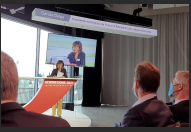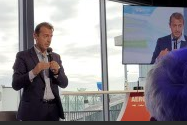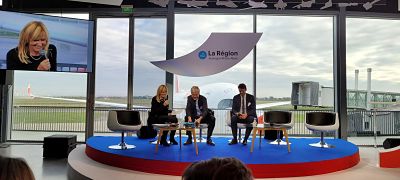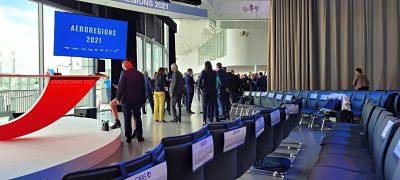Toulouse, November 22, 2021
Aeronautics, a competitive industry, ready to take on new challenges
GIFAS (Groupement des Industries Françaises Aéronautiques) organized the first edition of “Aero’Régions” on November 18, 2021 at Airbus’ premises in Toulouse.
The aim of this first meeting was to bring together in a single place the aeronautical industrial world and the regions in which it is located. No less than 5 regional presidents attended: Laurent Wauquiez, Rhône-Alpes region, Hervé Morin, Normandy region, Alain Rousset, New Aquitaine region, Renaud Muselier, Provence Alpes Côte d’Azur region, Carole Delga, Occitanie region.
Also present were Mr. Damien Cazé, Director General of Civil Aviation, Mr. Pierre Pélouzet, Médiateur des Entreprises and representatives of the State.

The President of the Occitanie Region summed up the objective of the meeting as follows: “We need to work together more regularly and with a very specific operational objective on the part of the regions, that of adapting our systems and our responses to the service of companies as well as possible.
The aeronautics industry must deal with two crises at once: the recovery, and the transformation of skills and training for new, more environmentally friendly modes of transport.

According to Airbus CEO Guillaume Faury, airlines were not inclined to take a single plane from April 2020. Airbus has done a lot of work with the airlines, looking at the medium and long term, and reducing production by about 40%, but no more. Thanks in particular to the solutions that have been found at the local level with the regions to support the companies and Airbus in this difficult period.
From November 14 to 18, 2021, the Dubai Air Show, with its batch of large orders, showed that the recovery has begun.
The aeronautics sector is emerging from a very unexpected crisis that has thrown the industry into an unprecedented situation, with 14,000 aircraft on the ground. Airbus found itself last year in April 2020 with a lot of uncertainty, and looked for solutions. Most of the players gambled on the recovery, making a trade-off between the short and long term, and many of them cut back. The result is a 28% drop in revenues for the industry, while defense and space revenues have remained stable.
Guillaume faury said “We have yet to win the bet that aviation will rebound, which implies a need to support the industry in the face of the difficulties that lie ahead.
Countries that depend on tourism are in catastrophic situations, and let’s not talk about diplomatic situations that are deteriorating due to a lack of physical relations.
This exit from the crisis is a crisis in itself, because of the problems of the increase in the price of raw materials and logistics, of the evolution of the prices of maritime freight multiplied by 20. A lot of staff has left and there are new training needs. Inflation is growing. “
The sector is also facing the challenge of transformation, decarbonization, digitalization, where all partners have to invest, accompany, and provide vision, in other words, a profound transformation for which there is very little time.
Guillaume Faury pointed also that Defense is also in danger because it must comply with a sustainable development policy while at the same time finding funding to guarantee its strategic independence. “Defence companies need funding and the public authorities must help them to guarantee a safe world, because our democracies and their associated values are in danger.”
The support of the Regions to the aeronautical industry must be done by aiding investment in innovation and research, the establishment of new skills and training. The aim is to create territorial ecosystems around the green aircraft and defense.

Laurent Wauquiez, president of the Auvergne Rhône-Alpes region, which has 300 companies, 3,000 jobs and 1,500 new hires per year, said: “We can’t treat everyone, but our goal is to help some of our young companies grow to the size of an ETI (intermediate-sized company). We make choices, we want our champions to assert themselves and grow to become world leaders.”
During this meeting Laurent Wauquiez developed his analysis and a vision of the way forward.
According to him, “our country is deconstructing its relationship with work, and this is worrying. The social and fiscal system does not value work sufficiently and this is a key problem.” The Rhône-Alpes Region has decided to structure an aeronautical campus that is global and that highlights the attractiveness of training.
Laurent Wauquiez said” Industry is the basis of value creation in an economy. We must defend industry in all its components. The Startup Nation is very good, but the startup nation without industry is nothing at all. We have come through the crisis well and the main challenge is to accompany the recovery. We need to combine our strengths. We can’t control things from Paris over the long term. We need to create territorial ecosystems, with the regions. We need a more decentralized approach. It is no coincidence that the great European nations are all decentralized nations. We need to bring to life an approach that starts from the territories. This is fundamental for the future.”
Renaud Muselier said that the “France Relance 2030” plan offers the prospect of a low-carbon aircraft produced in France, and this will require a territorial approach that mobilizes all ecosystems.
In the shorter term, there are two major challenges for the aeronautics industry.
The first is the current supply problems (electronics, materials, etc.), which are very significant and require short-term solutions with the help of dedicated working groups. We also need to encourage prime contractors to provide visibility to subcontractors so that they can better manage this recovery period and anticipate the replenishment of stocks.
The second challenge is to finance projects to relocate or recycle certain essential elements for the aeronautics industry (e.g. super alloys or titanium), to significantly reduce our dependence on them over the next two to three years.
This first Aero’Régions meeting between aeronautics manufacturers and the regions present enabled the participants to take stock of the challenges to be met in the face of the COVID crisis, the decarbonized aircraft and the strategic independence of the industry and defense. The unanimous conclusion of the participants is that industry and region cooperation is essential and must be developed at a higher level than today, in order to strengthen our industrial capacities and bring prosperity. Given the success of this first Aero’Régions 2021 meeting organized by GIFAS, there is no doubt that it will be followed by many others with even more industrial and regional participants. Nadia Didelot for AeroMorning





Be the first to comment on "A sector ready to take off"